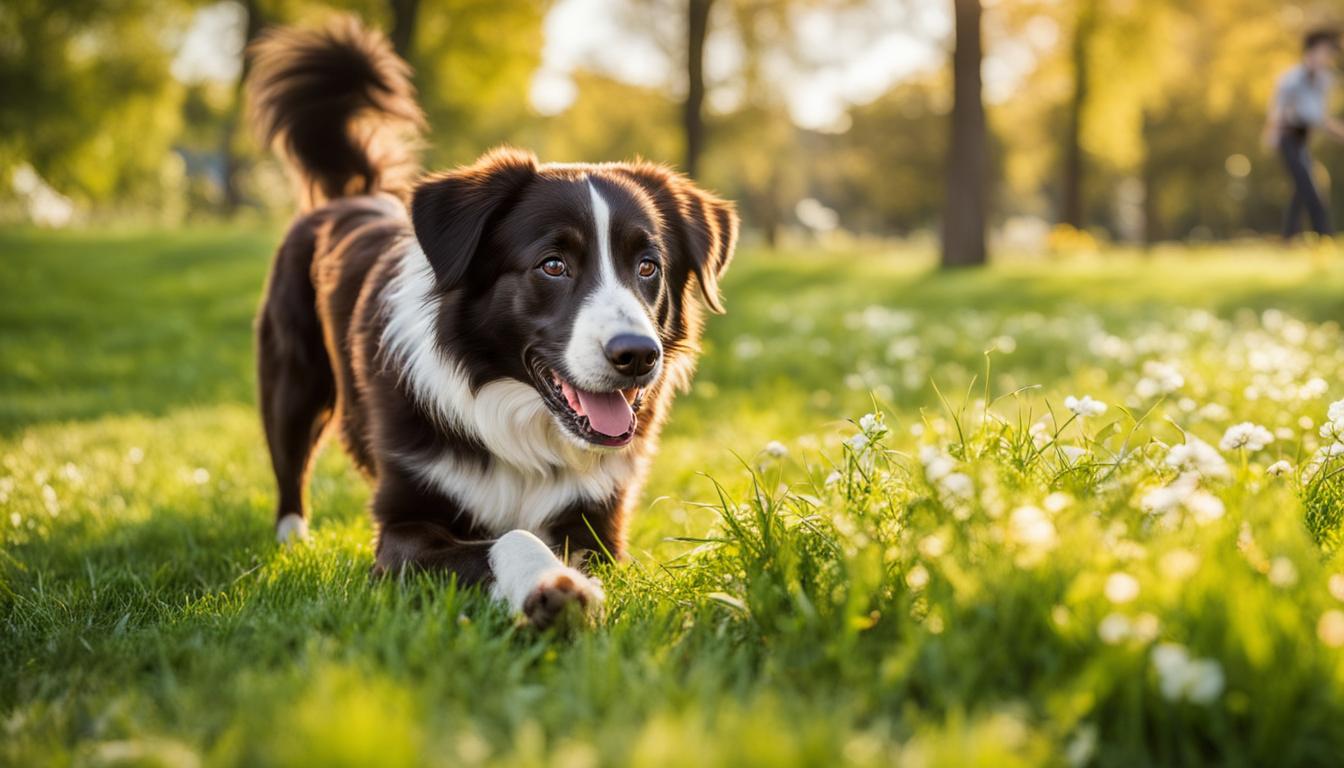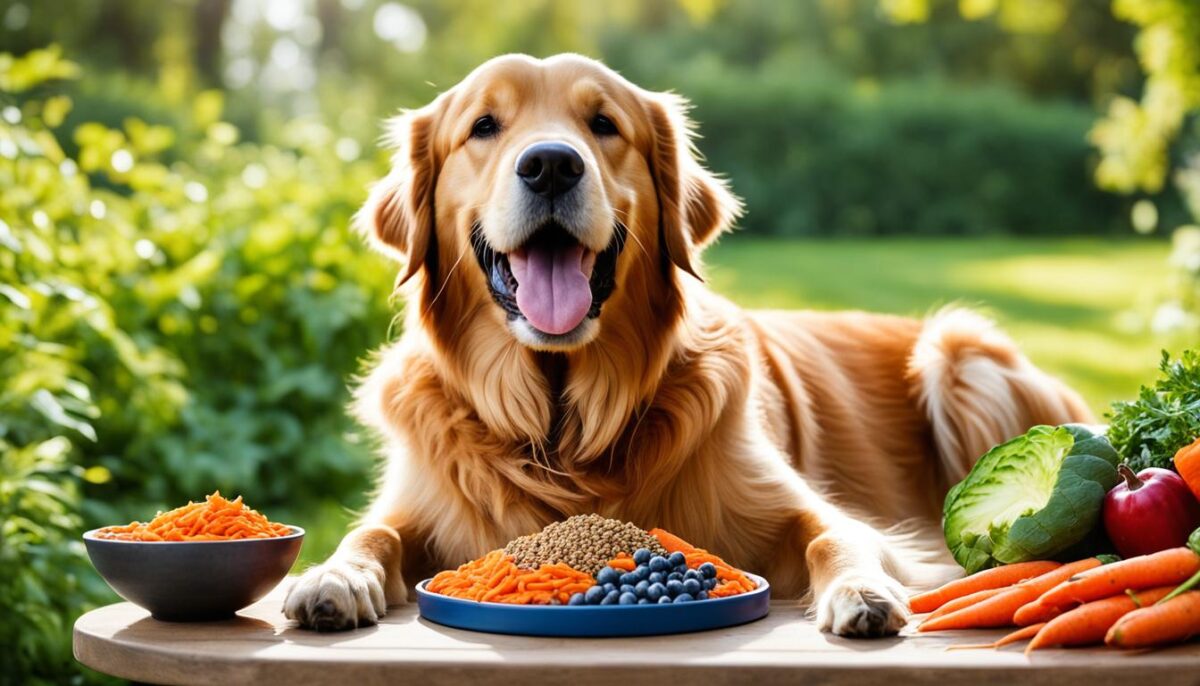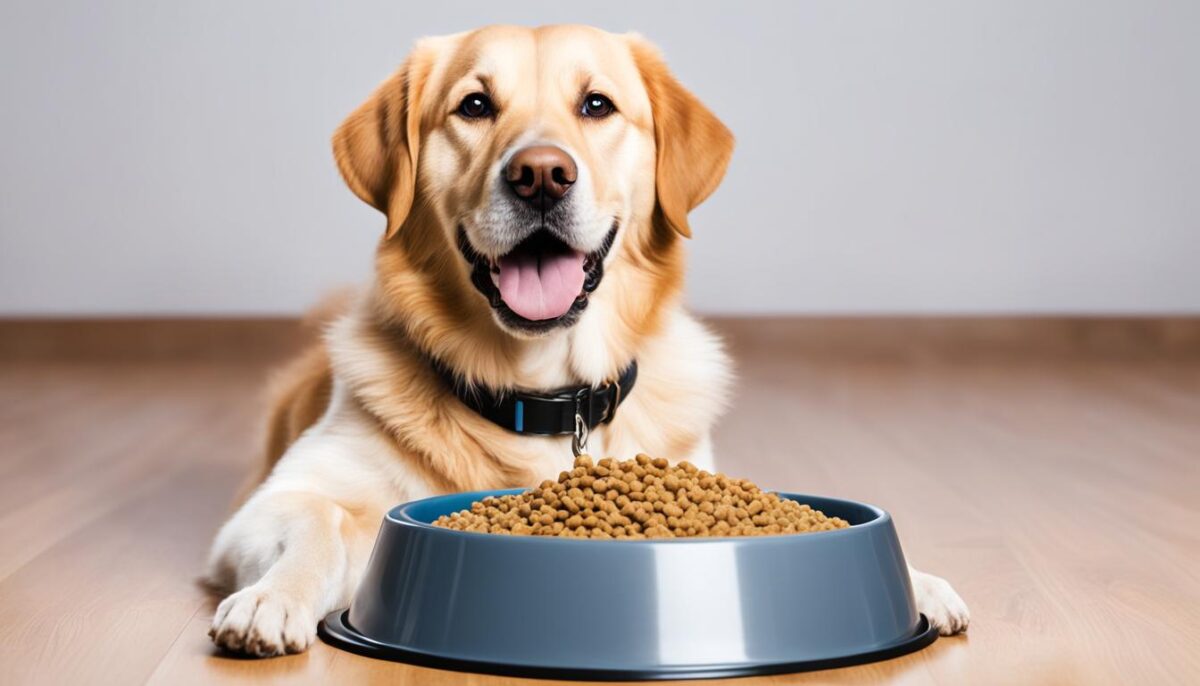Does your furry friend scratch a lot? Feeling itchy is no fun. Your dog may need a change in what they eat. The dog itchy skin diet could help your pup feel better. Sometimes, the itch is because of food. There are special itchy skin dog foods that can soothe canine discomfort. Finding what’s making the itch helps a bunch. It might be stuff in the air or what your dog is eating.
Key Takeaways
- Food can make your dog itch or stop itching.
- Changing what your dog eats might make their skin feel better.
- Look for foods that are made just for dogs with itchy skin.
- Always figure out why your dog is itchy before changing their food.
- Talk to your vet about what to feed your itchy dog.
Understanding the Root Causes of Canine Itchiness
When your dog keeps scratching, you may wonder why. Often, the itchiness comes from things like canine allergies or food intolerances. But, it’s not always simple to know what’s causing the trouble. That’s where getting veterinarian advice can help figure things out.
Recognizing the Symptoms and Triggers
Is your pup scratching a lot? Do they have red skin or do they seem uncomfortable? If yes, they could have dog skin irritation. Dust, pollen, and even some foods can make a dog itchy. There are also bugs that bite, like fleas, or things that can infect the skin that might make your dog itch.
It’s important to watch your dog and see when they scratch. Is it after they eat? Or maybe when you come back from a walk? Keeping a note might help you and the vet know what’s making your dog itchy.
Consulting with a Vet for Accurate Diagnosis
It’s best to ask a vet when you think your dog has itchy skin. They know a lot about dogs and can check your pup’s skin. They might even choose to do an itchy skin diagnosis. This might mean testing for different food allergies or looking for other reasons for the itchiness.
The vet might suggest trying an elimination diet. This means feeding your dog special food that does not have the usual ingredients in it. If your dog stops scratching, those ingredients might be the problem. Then, slowly, you can give your dog their old food. If they start scratching again, you might find out what food they’re allergic to.
Remember, it’s important to let a vet help you find out why your dog has itchy skin. They will give you the best advice to make your furry friend feel better!
What to Feed Dogs with Itchy Skin
When your cheerful pup is scratching a lot, it can make you worry. Remember, what they eat matters! Finding the best dog food for itchy skin can turn frowns into wags. Good food helps with their canine skin health. Let’s look at some yummy foods that are also kind to their skin.
Some dogs need special food, like anti-inflammatory dog food. These foods do not make the skin angry. They have special oils from fish and plants that help your dog feel better. Here are some choices your furry friend might love:
- Fish-based diets: These are full of oil that’s good for the skin.
- Venison or other special meats: They are not the usual meats, so they might be nicer to your dog’s skin.
- Food without grains: No wheat, corn, or soy for pups that can’t have grains.
- Natural ingredients only: We say no to fake colors and flavors!
| Type of Food | Good Stuff Inside | Why It’s Good for Skin |
|---|---|---|
| Fish-based Food | Omega-3 Fatty Acids | They make the skin less itchy. |
| Grain-Free Food | Vegetables and Fruits | They help without making the skin upset. |
| Hypoallergenic Diet | Fish or Venison | These meats are less likely to cause itchiness. |
Remember, always choose what’s best for your dog’s health. The right food can give your pup a happy life without itchy skin.
Hypoallergenic Diet: A Path to Relief
When your furry friend is scratching all the time, a simple change might help. Hypoallergenic dog meals could be the answer. This means giving them food with easier ingredients that won’t upset their tummies or make their skin itch.
Exploring the Benefits of Limited Ingredient Diets
Limited ingredient dog food usually uses one kind of meat. This can make it easier for you to find out what’s bothering your dog. With just a few things in their bowl, their bodies might feel a lot better. Imagine eating a plate with just your favorite, tummy-friendly foods — that’s kind of what these diets do for dogs.
The Role of Novel Proteins in Managing Allergies
Switching to novel protein options might be a big help. What’s that? Well, it’s like trying a brand-new snack that you’ve never had before. Dogs might love munching on exotic meats for dogs like kangaroo or different kinds of fish. These aren’t the usual meats and might not scratch that itchy allergy spot.
Let’s look at some of these unique protein choices in the handy table below:
| Protein Type | Benefits | Why It’s Hypoallergenic |
|---|---|---|
| Kangaroo | Lean and full of iron | Rare in dog diets, less likely to cause allergies |
| Venison | Rich in protein, low in fat | Not commonly allergenic for dogs |
| Sardines | Full of healthy oils for shiny coats | Usually safe for sensitive dogs |
| Novel Fish | High in omega fatty acids | Different from typical chicken or beef options |
Remember, before you bring home a bag of unique protein dog food, it’s always a good idea to talk with your vet. They are smart cookie-knowers about what might work best for your pup’s itchy woes.
Balancing Omega Fatty Acids
For your furry friend’s health, getting the right balance of omega fatty acids for dogs is super important. These special oils are like a secret weapon for keeping your dog’s skin feeling good and looking shiny. They can even help with inflammation reduction. This means that they might help your dog’s skin not get so red, puffy, and itchy.
Omega-3s versus Omega-6s: Finding the Right Mix
Omega-3 and Omega-6 fatty acids both play a role in your dog’s body, but they do different things. Omega-3s are really good at keeping your dog’s body from having too much swelling. We want more of these to keep everything balanced. On the other hand, too many Omega-6s might make swelling and itchiness worse, which is definitely not what your pup needs. The key is to get more Omega-3s in your dog’s bowl to help them feel their best.
Incorporating Fish Oil and Flaxseed into Your Dog’s Diet
Fish oil benefits for dogs are pretty awesome. It’s a smooth liquid that comes from fish, and it’s full of Omega-3s. Another great option is flaxseed meal for dogs. It comes from tiny seeds but is a big deal when it comes to essential fatty acids. Just a sprinkle over your dog’s food could make a big difference in giving them a shiny coat and happier skin. But, remember to start with just a little bit and check with your vet to find the perfect amount for your pup.
By adding the right dose of Omega-3s through either fish oil or flaxseed, you could see your dog’s coat go from dull and itchy to shiny and smooth. It might even reduce the scratching that has been bothering your furry friend. Finding that sweet spot for canine dietary balance isn’t just good for your dog’s coat; it’s great for their overall health too!
Natural Supplements for Skin Health
Hey there, fur parent! Let’s dive into how dog skin supplements and nutritional aids can boost your canine’s coat health. Just like us, our four-legged friends need a little extra care sometimes to keep their skin happy and healthy.
Getting to Know Nutritional Supplements from A to Zinc
You might have heard about the magic of coconut oil or the power of plant-derived quercetin. These are just two examples of the natural supplements that can support your dog’s skin health. Enzymes also play a big role—they help make sure your dog gets the most out of their food. Below is a simple guide to help you understand:
- Coconut Oil: It can be applied directly on the skin or mixed into food, and it’s great for creating a shiny, soft coat.
- Quercetin: This natural substance comes from plants and acts like a natural antihistamine to help manage allergy symptoms.
- Enzymes: Digestive enzymes boost gut health, making sure your dog absorbs all the good nutrients from their meals.
Always chat with your vet before adding new things into your pup’s routine, as they can guide you on the right path for your dog’s unique needs. These doggy nutritional aids are like adding a sprinkle of health to your pup’s life—they help from the inside out!
Foods to Avoid for a Dog’s Healthier Skin
If your dog has itchy skin, some foods could be making it worse. Like us, dogs can have canine food allergies. Just like people, dogs can feel bad if they eat stuff they’re not supposed to. It’s important to know which ingredients causing itchy skin should stay out of your dog’s bowl. Foods that often cause problems include wheat, corn, and soy. These can be itchy for dogs with sensitive tummies.
Another tip is to stay away from “by-products” or “meals.” These words on your dog’s food label might mean there’s stuff in there that can make the itch worse. Instead, look for food that has lots of meat. Meat is good for dogs, and not having a lot of grains in the food can help keep their skin happy. Listen to your vet about what foods to give to your dog and which ones to skip, so you know you’re doing the best for your furry friend.
Keeping away from these dog diet restrictions can be a big help for dogs with itchy skin. When picking food for your dog, think about how it might affect their skin. If you pick the right food, your dog might feel less itchy. They’ll be able to play and cuddle more, and that’ll make both of you happier!
FAQ
What should I feed my dog to help with itchy skin?
Consider a hypoallergenic diet or the best dog food for itchy skin that is rich in omega-3 fatty acids, such as foods with fish, venison, or alternative novel proteins. Foods that include natural supplements like fish oil or coconut oil can also soothe your dog’s skin discomfort.
What are some common causes of itchy skin in dogs?
Common causes include canine allergies to certain foods or environmental factors such as dust or pollen, food intolerances, skin infections, dry skin, and infestations from biting bugs.
How can I identify what is causing my dog’s itchy skin?
To correctly identify the triggers for your dog’s itchy skin, you should consult with a veterinarian. They can provide an accurate diagnosis and may suggest an elimination diet to pinpoint food intolerances or allergies.
What is a hypoallergenic diet for dogs?
A hypoallergenic diet for dogs typically includes limited ingredient dog food that uses single-protein sources and minimizes allergenic components. Novel protein options or exotic meats may be used to reduce allergic reactions.
What’s the difference between omega-3 and omega-6 fatty acids for my dog?
Omega-3 fatty acids, often found in fish oil and flaxseed, are known to help with inflammation reduction and support canine skin health. Omega-6 fatty acids can be pro-inflammatory in excess. Balancing these essential fatty acids is crucial for maintaining your dog’s coat and skin condition.
Can natural supplements help with my dog’s skin health?
Yes, natural supplements such as coconut oil, quercetin, zinc, and digestive enzymes can improve skin health and help manage symptoms of allergies. However, it’s important to discuss any new supplements with your veterinarian before adding them to your dog’s diet.
Are there certain ingredients I should avoid in my dog’s food to prevent itchy skin?
Yes, avoid feeding your dog foods that contain common allergens like wheat, corn, soy, by-products, and meals. Opt for quality meats and grain-free options when possible to help alleviate itchy skin and promote healthier skin and coat.


